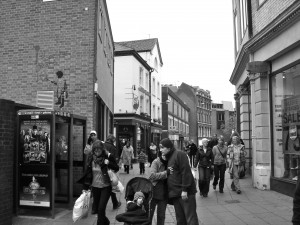The second co-worker of mine that stands out in my mind does everything he or she can to do exactly the opposite of that. This person is, as Kate Fox would describe, the typical socially dis-eased English person. In no way is this person rude; rather, he or she is simply silent as to not ever ask what could be deemed as an invasive question. While we Americans appreciate boundaries, we will tend to ask where someone is from, what they enjoy doing, and even dare to inquire about one’s name. The socially dis-eased English person will never dive into such murky waters and this co-worker displays this quality exceptionally well.
Before continuing this description anymore, let me pause to detail my understanding of what the term ‘socially dis-eased’ even means. It’s not a term I enjoy using. It does seem rather unfair to the people being described as it paints them as almost perpetually uncomfortable and uncomforting. This hasn’t been my experience at all in England! People have always been polite and kind but, beyond just those qualities, I have found many to be chatty and warm-spirited. I was invited to spend the winter holidays with a family who had never met me simply because they are a kind family that after hearing that I would not be with my own family on Christmas demanded (without hesitation I might add) that I spend the time with them. They did more than only offer me a spot to stay for a few days. They included me in all their celebrations, treated me like family in their jokes, gift-giving, and chore responsibilities, and never asked for anything in return. The term social dis-ease seems to rob such people of their kindness. Having stressed just how welcoming I have found the English people to be, I have to concede that I agree with Fox that most do have this social dis-ease that she describes. It’s not a rudeness. It’s a highly peaked fear of coming across as too bold, too pushy, too loud, too out of the norm. There is a time and place to be creative, forceful, boisterous, and quirky. Introductions and, often times, the work place do not fall into the category of those acceptable times and places; therefore, one has a great opportunity when finding oneself in a working environment to observe the very social dis-ease that Fox finds so prevalent in the English culture.
I’ll re-enact my introduction to this co-worker to best portray the dis-ease of the situation. Keep in mind that his or her side of the conversation never exceeded anything much above a whisper. I’ll note myself as ‘A’ for Audrey and the co-worker as ‘P’ for person to make things clear.
A: Hi. I’m Audrey. I just started volunteering today.
P: Oh hello. Nice to meet you.
A: It’s nice to meet you too. What can I help with?
P: I don’t know. You’ll have to wait for the boss. I don’t think I’m allowed to tell you what to do.
A: Oh ok…that makes sense.
P: Normally people do the washing up first thing in the morning. That’s not to say that you should because the boss might want you to do something different. That’s just what some people do when they first start here. Not that you can only wash up, I’m sure you can do many things well. Maybe you should just wait for the boss.
A: Ok, I’ll do that. Thanks. [Pause]. So, have you been volunteering here long?
P: Awhile.
A: Oh. [Pause] Good! You’ll be able to show me the ropes then. I tend to have a knack for putting things away in the wrong place [Attempted laugh]
P: [Without laughing] I’m sure you’ll figure it out. The system is rather simple actually.
A: [Stops laughing awkwardly] Right. Other people have figured it out just fine. I’m sure I’ll get the hang of it soon! Hopefully! [Another attempted giggle]
P: [Again, without laughing] We have a lot of volunteers rotating through here so it’s as simple as it can be. You’ll be fine.
A: [Again, awkwardly stops laughing] Right. [Pause] [Pause] [Pause] So, the weather is awfully chilly today.
P: It’s not so bad. Just need a jacket and you get through it.
The conversation continued painfully slowly as we continued to wait for the boss to come from around the corner. I considered multiple times going up to where the boss was to directly ask her what I could start doing. Scared that that might violate some social norm, I decided to hang back and forge through a conversation with P. In that conversation never did I learn P’s name, his or her occupation, interests, age, involvement with the Greenhouse Trust. We were simply to co-volunteers existing in the same place with a task at hand. No additional information had to be shared between us. My insistence in trying to start up conversation that broached these subjects was as annoying and uncommon to this co-worker as his or her refusal to give any information or make any small talk was to me. It’s this type of aversion to small talk, this tendency to remain unknown and unknowing until a familiarity with the other person has been established, that Kate Fox described and that I’m witnessing first hand in my volunteer experience.

